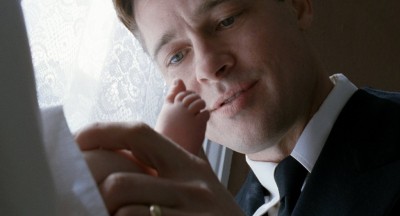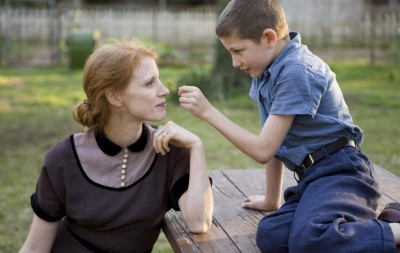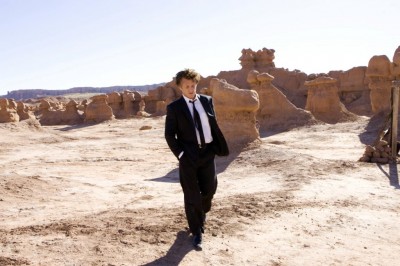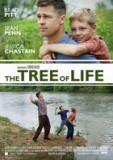| Reviews & Columns |
|
Reviews DVD TV on DVD Blu-ray 4K UHD International DVDs In Theaters Reviews by Studio Video Games Features Collector Series DVDs Easter Egg Database Interviews DVD Talk Radio Feature Articles Columns Anime Talk DVD Savant Horror DVDs The M.O.D. Squad Art House HD Talk Silent DVD
|
DVD Talk Forum |
|
|
| Resources |
|
DVD Price Search Customer Service #'s RCE Info Links |
|
Columns
|
|
|
Tree of Life, The

Before anyone dares enter the cinematic realm of "The Tree of Life," this much must be emphasized: it's a Terrence Malick motion picture. The famously enigmatic filmmaker emerges from the shadows once again with this mystifying elegy, returning for his fifth motion picture since 1973. Malick doesn't work a whole lot, but when the man feels the urge to create, he doesn't screw around. A meditation on life, family, innocence, grief, and the origins of the universe, "The Tree of Life" is essentially Malick calling his shot, stepping up with Babe Ruth swagger to examine, you know, the meaning of life. And bless his no-publicity heart, he actually achieves a few tangible answers.
If there's a plot to "The Tree of Life," and that's open for debate, I suppose it would concern the decay of Jack (Sean Penn as an adult, Hunter McCracken as a boy), who's suffocating in his urbanized environment. Longing for his formative years, Jack recalls his Waco, Texas upbringing with strict father Mr. O'Brien (Brad Pitt), free-spirit mother Mrs. O'Brien (Jessica Chastain), and his two little brothers. Experiencing the daily miracles of life in suburbia, Jack develops into a distressed boy, feeling the burden of Mr. O'Brien's rough disciplinary actions, leaving his head a swirl of questions and prayers, openly contemplating God and heavenly plans. Consuming a daily diet of earthbound glory, Jack experiences the traditions of maturation and the forming of his fractured personality.

I found Malick's previous picture, 2005's "The New World," to be a profound joy, with the filmmaker's penchant for fetishizing nature crashing against the demands of a historical story, forming a something of a structure that kept the director on task, while permitting his customary swirls of operatic observation. "The Tree of Life" finds Malick returning to the comfort of the abstract, shaping a mystical tale of life in motion, from the dawn of time to the modern day, though expressed in the most puzzling manner possible. In short, Malick has fashioned a visual ballet, where characters and planets collide, molding an esoteric assessment of the metaphysical unknown, mixing the chaos of boys, God, dinosaurs, and guilt in a giant wood bowl of complex film artistry. This is not a feature to passively experience; it's a probing, winding creature that demands concentration and endurance.
Assembled with traditional applications of whispered, exploratory interior monologues and indiscriminate shots of behavior and textures, Malick is employing his routine to achieve a sophisticated tone of discovery. This is not an easy film to summarize or absorb, literally taking the viewers into the cosmos to witness the formation of the planet with an incredible display of visual effects and thunderous science. We view dinosaurs interacting with instinctual menace and leniency before the tale plants itself in the 1950s, picking up Jack's story, observing the boy as he passes through his adolescence under the thumb of his increasingly defeated father -- a stymied man failing to set a commanding example for his children.
That narrow space of innocence is where "The Tree of Life" achieves its careworn brilliance. Love him or hate him, Malick understands the purity of moments, the miniature miracles of life that we encounter every day but often fail to recognize. Being the 1950s, Jack's purity erodes with the progression of the era, hit from all sides by temptation and dysfunction, growing from a play-happy kid to a humiliated, regretful young adult in search of his moral center, with urges to sort through and disorderly parental behavior to decode. If the film had elected a straight narrative route to investigate Jack's awakening, "The Tree of Life" would've been conventional but miraculous, exposing the wounds of youth with a tender, knowing frame, sharing those cuts and bruises with a shrewd audience. Something tells me southerners and first-born children are going to find much to relate to here.

However, there's nothing conventional about "The Tree of Life," which is exactly how Malick likes to work. He strings together a series of deeply personal moments, intercut with glimpses of nature's blossoming splendor, shaping an event, not a story. It's not an easily tolerable feature, with the 135-minute running time soon resembling punishment in the picture's extraordinarily winded final act, where Malick fills up a Super Soaker with abstraction and wets the movie down with laborious symbolism and infuriatingly self-conscious performances. Stasis is Malick's best friend and this film continuously pumps the brakes, hunting to detect flashes of splendor or reaction that contribute to the overall tone of enlightenment. This is why Malick is such a divisive filmmaker and why "The Tree of Life" goes from astonishing to let's-burn-down-the-theater aggravating at a moment's notice.
It contains undeniable beauty, wonder, and directorial determination, yet I wouldn't recommend "The Tree of Life" to just anyone. It takes a PhD in Malickian madness to even approach this bewildering creation. So, beware my dear readers. This film could either transport you to another plane of existence or make you swear off moviegoing for the rest of the year.
|
| Popular Reviews |
| Sponsored Links |
|
|
| Sponsored Links |
|
|
| Release List | Reviews | Shop | Newsletter | Forum | DVD Giveaways | Blu-Ray | Advertise |
|
Copyright 2024 DVDTalk.com All Rights Reserved. Legal Info, Privacy Policy, Terms of Use,
Manage Preferences,
Your Privacy Choices | |||||||











